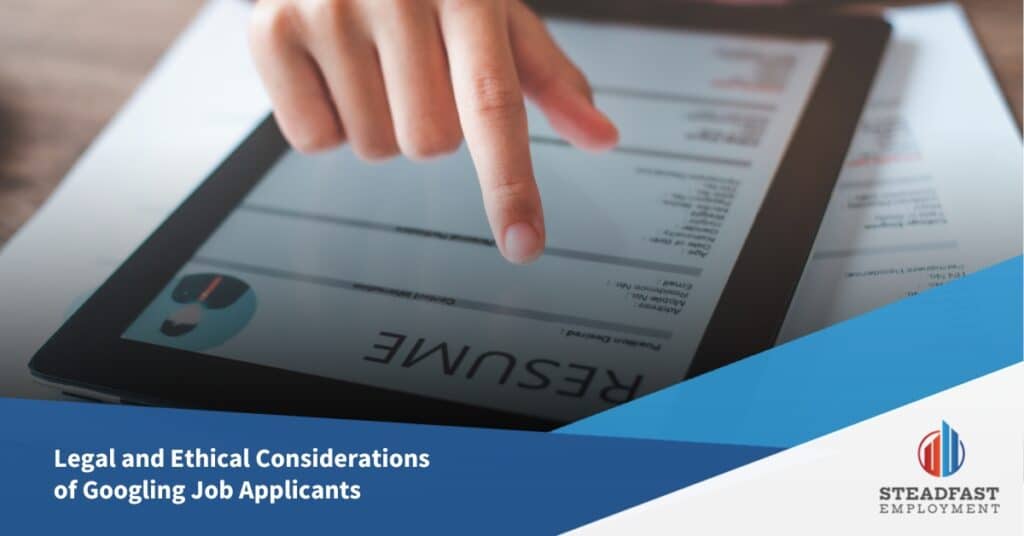In today’s digital era, the line between professional and personal life blurs online, presenting a unique conundrum for hiring managers and job applicants alike. As we negotiate the vast amount of information available at our fingertips, it’s crucial to remember the legal and ethical considerations that guard the integrity of recruitment processes. Here, we explore how to navigate these challenges with respect, responsibility, and fairness.
Legal Framework: Anti-Discrimination Compliance
Understanding the complexities of anti-discrimination laws is paramount when considering Googling job applicants. The internet is a treasure trove of information, but not all that glitters is gold—especially when it comes to unbiased hiring. Federal and state laws are clear: selection processes must be fair and equitable, irrespective of the candidate’s race, gender, age, and other protected characteristics that might inadvertently surface during an online search. It’s vital for employers to question not just the legality but also the relevance of the information they find online, ensuring that their practices are above reproach.
The key lies in consistency and documentation. When hiring managers choose to include online research as a component of their candidate evaluation process, it must be applied uniformly across all applicants. Furthermore, maintaining records of exactly what was found and how it influenced the hiring decision can offer valuable protection against potential legal challenges, serving as concrete evidence that the organization’s hiring practices are both fair and transparent.
Ethical Concerns: Privacy and Integrity
Privacy, in the age of digital footprints, is a complex issue. Just because information can be found online does not necessarily mean it should be used in the hiring process. At the heart of ethical recruitment lies the respect for an individual’s privacy, weighing the relevance of found information against its intrusion into the candidate’s personal life. Ethical hiring focuses on the applicant’s professional qualifications, skills, and experiences relevant to the job role rather than personal opinions, affiliations, or activities that bear no impact on their potential as an employee.
Crossing the thin line of privacy can lead to erosion of trust and reputation, both for the individual and the company. It’s essential to foster a culture of integrity within the organization, ensuring that every step of the hiring process reflects the company’s commitment to ethical standards. Transparency about the use of publicly available information can mitigate misunderstandings and build a foundation of trust from the outset.
Best Practices: Fair Online Screening
Adopting best practices in online screening safeguards against bias and ensures a respectful and equitable hiring process. This includes developing a standard protocol for online searches that aligns with legal and ethical frameworks. Detailed training for hiring managers on what constitutes appropriate and relevant online research is critical. This training should emphasize respect for candidate privacy, focusing searches on professional platforms such as LinkedIn or industry-specific forums where the information is intended for public view and professional scrutiny.
Moreover, it’s beneficial to delay online searches until later in the hiring process. This approach allows for an initial assessment based on the candidate’s merits as presented through their resume, cover letter, and interviews. By prioritizing professional qualifications above all, employers demonstrate their commitment to fair and unbiased recruitment.
Policy Development: Ensuring Ethical Compliance
Crafting a clear, comprehensive policy on the use of online information in the recruitment process is a proactive step toward ethical and legal compliance. Such a policy should outline the types of information considered relevant and permissible for assessment, the stages of the hiring process at which online research will be conducted, and who within the organization is authorized to perform these searches. Transparency about this policy during the recruitment process reassures candidates of their rights and the fairness of evaluations.
A well-documented approach not only fosters trust but also empowers hiring managers to make informed decisions backed by a structured and ethical framework. Regular reviews of this policy ensure it remains aligned with evolving legal standards and societal expectations, maintaining the integrity of the hiring process.
Forge Ahead with Confidence and Integrity
At Steadfast Employment, we stand at the intersection of opportunity and integrity. Our commitment to guiding you through the complexities of recruitment ensures that your journey is both successful and principled. Embrace the promise of a recruitment process that is not just effective but also ethical and equitable. Together, let’s set a standard for excellence, fostering a future where every hiring decision is made with confidence, respect, and fairness.
Invest in the integrity of your hiring strategies with Steadfast Employment as your guide. Trust us to empower you with the knowledge, tools, and support to navigate the digital age without compromising on the values that define your success.

